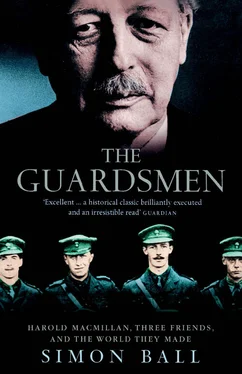That night Lyttelton moved up with 4 Company to relieve the shattered remnants of 3 Company: ‘it was pitch dark, raining and cold’. He and another officer went out to try and recover some of the wounded. ‘It was a bad job. Some of these fellows had crawled into shell-holes about twenty feet deep and getting them out was a critical business.’ ‘The whole place,’ wrote Lyttelton as he tried to piece together his experiences afterwards, ‘was a sea of mud, and the scene still remains incoherent in my memory, plunging about for overworked stretcher bearers, falling into shell-holes, losing our way, wet and tired, we felt all the time rather impotent.’ 41 Opinion among the surviving battalion officers was that the whole affair had been mismanaged. The generals had bungled in ordering them to attack on the afternoon of the 18th with so little warning. 42
The battle of Festubert convinced the relatives who had been instrumental in getting men into the Guards that service with a combat infantry battalion on the Western Front was not necessarily a good idea. When Cranborne was shipped home, it was discovered that his injuries were not serious and that he would soon be able to rejoin his regiment. ‘The ear,’ his medical board was told, ‘has been examined by a specialist and has been diagnosed as a course of labyrinthine deafness; prognosis good.’ 43 He was granted three weeks’ leave. While he was on leave the Cecils’ family doctor diagnosed him with appendicitis. His friends regarded this as an amazing stroke of luck, 44 as was clear from the letters of commiseration he received. It must be sore having a bad ear and a bad gut: ‘But,’ one friend serving with a line infantry regiment in France, added, ‘I wonder if you are sorry. For goodness’ sake don’t come out here again.’ 45 Lyttelton cheerfully chipped in, ‘There is a great deal of satisfaction in hearing from someone whom you have just seen in Flanders, at Park Lane.’ 46 Another friend, also recuperating from wounds, wrote, ‘I think we are both well out of it for a bit, Bobbety, don’t you agree with me. It was the most unpleasant two months I’ve ever spent and I don’t think you cared for it much – did you?’ 47
Cranborne attended regular medical boards. On each occasion his leave was extended. There seemed to be enough time to attend to his own affairs. He proposed marriage to Betty Cavendish, the daughter of Lord Richard Cavendish, the younger brother of the Duke of Devonshire. It was an entirely suitable match between two of the great aristocratic families of England, though Bobbety’s father wryly noted that his son’s choice had let him in for some difficult dowry negotiations: Dick Cavendish was notorious for pleading poverty. 48 Lord Richard, however, did his new son-in-law a good turn by intervening with the War Office to have his leave of absence extended to the end of the year. 49
Families were caught between a desire to see their sons removed from danger and their sons’ desire not to be seen pulling strings to escape the front line. Another junior officer in the Grenadier Guards, Raymond Asquith, son of the prime minister, angrily told his wife that: ‘The PM in disregard of a perfectly explicit order from me to take no steps in that direction without my express permission has tipped the wink to Haig…no one will believe that this [staff] job has been arranged without my knowledge…So in mere self-defence I shall have to try to get back to the Regiment when the fighting season starts.’ 50 He was right to suspect that people were keeping a spiteful eye on these things. When Asquith himself was killed, one of his father’s Cabinet colleagues wrote to a newspaper editor, ‘As for Lloyd George himself, he risks very little. His sons are well sheltered.’ 51
Someone was looking out for Oliver Lyttelton. Soon after meeting his mother in Brussels, he was offered a post as ADC to Lord Cavan. Cavan needed an ADC because he was to give up the 4th Guards Brigade and take command of a line division. ‘I feel very weepy reading of your meeting with Oliver and the news of Cavan’s offer,’ wrote Lyttelton’s uncle to his mother. ‘I do hope to heavens there will not be a hitch in Oliver’s appointment and that nobody will put any obstacles in the way or, which is just as important, [he] feel[s] that he oughtn’t to take it.’ If strings had been pulled, that was no cause for shame. ‘After all the boy has had his grilling in the trenches, gone out…and done the brave thing and if some general does choose to pick him out one can only be thankful…Of course there are plenty of risks still but it must be much safer than a platoon leader.’ 52 His friends agreed that his removal from the front line was a matter for celebration. 53
In fact intervention by figures considerably more eminent even than the Lyttelton clan was to change the pattern of the war for both Lyttelton and Macmillan. As Lyttelton took up his post, Lord Cavan was preparing himself to meet King George at Windsor. Cavan had gone home to visit his wife, who was sick with diphtheria. Calling in at Chelsea barracks, he was shocked when Streatfeild told him that not only would a fourth battalion of Grenadiers be formed, but that it would be sent to France as part of a Guards division. Two days later His Majesty graciously informed Cavan that he would command the new formation. As far as Cavan could tell, the idea had been put to the king by Lord Kitchener. It seemed that his lordship was keen to curry favour by giving the Prince of Wales, who was attached to the Grenadiers, a bigger stage on which to perform. Cavan did not believe that the division had any military logic. He was horrified to discover that the four battalions of Grenadiers were to be formed into a single Grenadier brigade within the division. This, no doubt, seemed a glorious idea in Windsor and Whitehall, but it struck the Grenadier Cavan as disastrous. As he explained to Kitchener, ‘if they went into action we might lose at one blow more officers than we could replace all belonging to one Regiment’. Although Cavan could do little about the fait accompli of a Guards division, he at least averted the potential destruction of the Grenadier Guards by insisting that all brigades contain a mixture of battalions from each Guards regiment. 54
Because of the creation of the Guards Division Lyttelton did not leave the Guards for a line division: he became a junior staff officer in the Guards Division. As Lyttelton left the 2nd Battalion, Crookshank joined it, having missed Festubert cooling his heels in a base camp near Le Havre. They were eventually able to meet up for tea and bridge when Lyttelton came back to visit his old unit. 55 Macmillan was also affected by the reorganization. Gazetted into the Grenadiers in March, he was assigned to the new 4th Battalion in July 1915. It was almost as if the old Eton pattern remained in place. The two Oppidans had used their influence to be first in and first out. Now the scholars had arrived. If Festubert was the baptism of fire for Cranborne and Lyttelton, Loos was to be Crookshank and Macmillan’s battle.
The first to arrive, Crookshank, had a hot welcome. Three days after he reached the 2nd Battalion they were sent into a set of notorious trenches known as the ‘Valley of Death’. Ten days later they moved to better trenches only to face the threat of a new, and lethally effective, German trench mortar – the Minenwerfer. Even when they retired to billets in Béthune, their luck did not improve. The Germans shelled the town, rendering their rest period ‘a farce’. 56 It was in the trenches near Givenchy, however, that Crookshank made his name in the regiment. The battle of Festubert had proved to the satisfaction of both British and Germans that charging enemy machine-gun emplacements was suicidal. The obvious alternative was to approach the enemy underground. Both sides had initiated a large number of tunnelling operations to set mines. The Germans in the Givenchy sector were particularly keen on these operations and had seized the upper hand: they made the Guards’ life both dangerous and miserable through a combination of mines and mortar bombs lobbed into the craters they created. ‘The casualties from mining and bombing in addition to those from rifle fire and shells were very heavy,’ noted the regimental history.
Читать дальше












